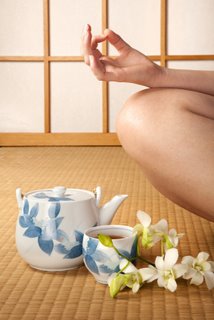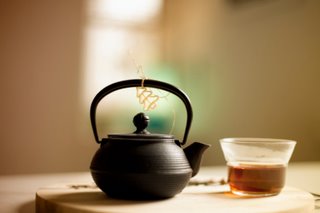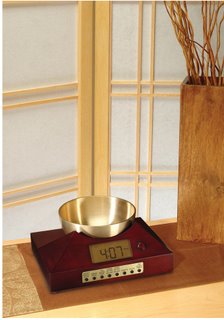
enjoy a meditative cup of tea
A meditative act
Many tea drinkers say that drinking tea is not the sole purpose for the ceremony. At the Rocky Mountain Tea Festival, an annual summer event hosted by the Dushanbe Teahouse in Boulder, Colorado, tea professionals from around the country impart information on ceremonies and tea varieties. At the heart of every presentation is the message that the spirit of tea (chado) is intricately linked with simplicity and calmness.
Fellman, a busy woman who values the sense of well-being she derives from tea, strikes a happy medium between a to-go mentality and a traditional tea ceremony by preparing two spots in her home with an electric kettle, canisters of loose tea, and a cup or teapot. Selecting her spots carefully to provide “something nice to rest my eyes on that feels nourishing to me,” Fellman can enjoy a good cup of tea in twenty minutes. When brewing tea, Fellman listens to the water bubble and watches for steam. She looks carefully at the amount of tea used, breathes in the gentle fragrance of the leaves, and waits for the warmth of the teacup to pull the tension from her shoulders. “The mindful process of making a good cup of tea,” she says, “helps me take time to stop and focus.”
It’s no coincidence that elements of tea preparation are reminiscent of meditation. Buddhist monks served tea in places where a rogi, or path, had to be crossed in order to reach the tearoom and, in essence, leave the cares of the world behind. Today, tea drinkers focus on the art of brewing tea to separate themselves from daily concerns.

time for a meditative cup of tea
Tea professionals suggest taking classes to learn the basic elements and history of the tea ceremony. “You can’t read a book and understand it,” says Austin Babcock, a member of the Washington, D.C., branch of the Urasenke Foundation, who likens tea ceremony education to mastering a martial art or learning to play an instrument. “It’s about getting it with your body. It’s an experience.” The Urasenke Foundation, a school of tea that offers classes worldwide, was founded by sixteenth-century tea master Sen no Rikyu, who is credited with establishing tea as a social and spiritual practice.
“There is a Zen quality” to tea ceremony, says Babcock. It creates “a calming, meditative space that allows you to open up your heart to another person. It is a powerful act of sharing . . . and of savoring the moment.”
adapted from Natural Home Magazine, September/October 2002 by Heather Grimshaw

a Tibetan bowl/gong timer for timing tea
Now & Zen’s Mindfulness Clock & Timer Store
1638 Pearl Street
Boulder, CO 80302
(800) 779-6383
Posted in intention, Meditation Timers, Meditation Tools, mindfulness practice, Zen Timepiece by Now & Zen, Zen Timers